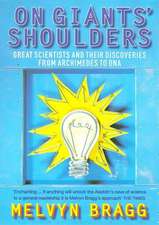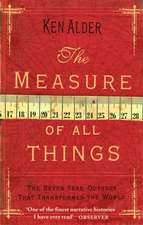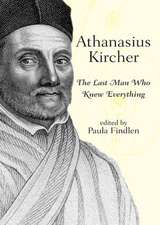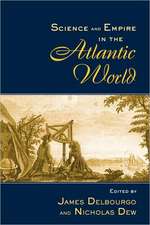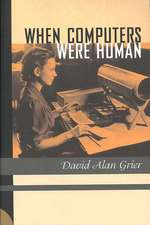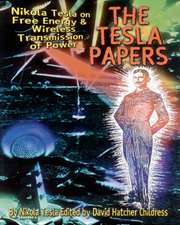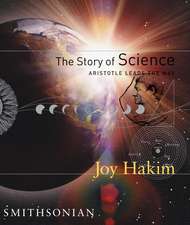The Rise and Fall of the Fifth Force: Discovery, Pursuit, and Justification in Modern Physics
Autor Allan Franklin, Ephraim Fischbachen Limba Engleză Hardback – 14 mar 2016
Over the next four yearsnumerous experiments were performed to test the hypothesis. By 1990 there wasoverwhelming evidence that the Fifth Force, as initially proposed, did notexist. This book discusses how the Fifth Force hypothesis came to be proposedand how it went on to become a showcase of discovery, pursuit and justificationin modern physics, prior to its demise.
In this new and significantly expandededition, the material from the first edition is complemented by two essays, onecontaining Fischbach’s personal reminiscences of the proposal, and a second onthe ongoing history and impact of the Fifth Force hypothesis from 1990 to thepresent.
| Toate formatele și edițiile | Preț | Express |
|---|---|---|
| Paperback (1) | 386.22 lei 43-57 zile | |
| Springer International Publishing – 25 apr 2018 | 386.22 lei 43-57 zile | |
| Hardback (1) | 393.52 lei 43-57 zile | |
| Springer International Publishing – 14 mar 2016 | 393.52 lei 43-57 zile |
Preț: 393.52 lei
Nou
Puncte Express: 590
Preț estimativ în valută:
75.32€ • 81.85$ • 63.31£
75.32€ • 81.85$ • 63.31£
Carte tipărită la comandă
Livrare economică 21 aprilie-05 mai
Preluare comenzi: 021 569.72.76
Specificații
ISBN-13: 9783319284118
ISBN-10: 3319284118
Pagini: 250
Ilustrații: XII, 249 p. 93 illus., 4 illus. in color.
Dimensiuni: 155 x 235 x 16 mm
Greutate: 0.54 kg
Ediția:2nd ed. 2016
Editura: Springer International Publishing
Colecția Springer
Locul publicării:Cham, Switzerland
ISBN-10: 3319284118
Pagini: 250
Ilustrații: XII, 249 p. 93 illus., 4 illus. in color.
Dimensiuni: 155 x 235 x 16 mm
Greutate: 0.54 kg
Ediția:2nd ed. 2016
Editura: Springer International Publishing
Colecția Springer
Locul publicării:Cham, Switzerland
Public țintă
ResearchCuprins
Preface.- Part I The Rise and Fall of the Fifth Force.- Part II Additional Material.- References.- Index.
Notă biografică
Professor Franklin's research is on the history and philosophy of science, with particular emphasis on the role of experiment in physics. On the philosophical side, he has worked on the Duhem-Quine problem, the question of how one can localize support or refutation, and on confirmation theory, using a Bayesian approach. More recently he has worked on the fallibility and corrigibility of experimental results and the resolution of discordant results.
Professor Fischbach is an originator of the fifth force hypothesis and Fellow of the American Physical Society (2001) for his contributions to understanding the connection between precision gravity measurements and high-energy physics.
Professor Fischbach is an originator of the fifth force hypothesis and Fellow of the American Physical Society (2001) for his contributions to understanding the connection between precision gravity measurements and high-energy physics.
Textul de pe ultima copertă
Thisbook provides the reader with a detailed and captivating account of the storywhere, for the first time, physicists ventured into proposing a new force ofnature beyond the four known ones - the electromagnetic, weak and strongforces, and gravitation - based entirely on the reanalysis of existingexperimental data.
Back in 1986, EphraimFischbach, Sam Aronson, Carrick Talmadge and their collaborators proposed amodification of Newton’s Law of universal gravitation. Underlying this proposalwere three tantalizing pieces of evidence: 1) an energy dependence of the CP (particle-antiparticleand reflection symmetry) parameters, 2) differences between the measurements ofG, the universal gravitational constant, in laboratories and in mineshafts, and3) a reanalysis of the Eötvos experiment, which had previously been used toshow that the gravitational mass of an object and its inertia mass were equalto approximately one part in a billion. The reanalysis revealed that, contrary to Galileo’sposition, the force of gravity was in fact very slightly different fordifferent substances. The resulting Fifth Force hypothesis included thiscomposition dependence and also added a small distance dependence to theinverse-square gravitational force.
Over the next four yearsnumerous experiments were performed to test the hypothesis. By 1990 there wasoverwhelming evidence that the Fifth Force, as initially proposed, did notexist. This book discusses how the Fifth Force hypothesis came to be proposedand how it went on to become a showcase of discovery, pursuit and justificationin modern physics, prior to its demise.
In this new and significantly expandededition, the material from the first edition is complemented by two essays, onecontaining Fischbach’s personal reminiscences of the proposal, and a second onthe ongoing history and impact of the Fifth Force hypothesis from 1990 to thepresent.
<
Back in 1986, EphraimFischbach, Sam Aronson, Carrick Talmadge and their collaborators proposed amodification of Newton’s Law of universal gravitation. Underlying this proposalwere three tantalizing pieces of evidence: 1) an energy dependence of the CP (particle-antiparticleand reflection symmetry) parameters, 2) differences between the measurements ofG, the universal gravitational constant, in laboratories and in mineshafts, and3) a reanalysis of the Eötvos experiment, which had previously been used toshow that the gravitational mass of an object and its inertia mass were equalto approximately one part in a billion. The reanalysis revealed that, contrary to Galileo’sposition, the force of gravity was in fact very slightly different fordifferent substances. The resulting Fifth Force hypothesis included thiscomposition dependence and also added a small distance dependence to theinverse-square gravitational force.
Over the next four yearsnumerous experiments were performed to test the hypothesis. By 1990 there wasoverwhelming evidence that the Fifth Force, as initially proposed, did notexist. This book discusses how the Fifth Force hypothesis came to be proposedand how it went on to become a showcase of discovery, pursuit and justificationin modern physics, prior to its demise.
In this new and significantly expandededition, the material from the first edition is complemented by two essays, onecontaining Fischbach’s personal reminiscences of the proposal, and a second onthe ongoing history and impact of the Fifth Force hypothesis from 1990 to thepresent.
<
Caracteristici
Unique account of the history of the fifth force Co-Authored by the originator of this hypothesis Contains an up-to-date review of the impact on present-day research






